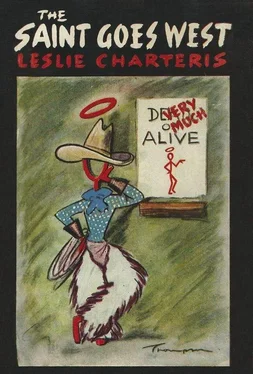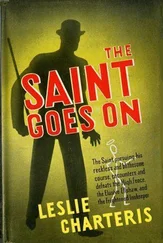“One way is enough,” he said. “There are no bets on the return journey.”
But his eyes said everything else that there was no time to speak.
And then he was rising to greet Don Morland as he came up the porch steps, as though nothing at all had happened since they had parted.
The old man’s step was quick and nervous, and he asked the obvious question in the most obviously conventional way.
“Who was that fellow I passed on the road?”
“He was working his way through correspondence college,” Simon replied gravely, “with a line of hogwash and fertiliser. I told him we didn’t keep hogs and we weren’t farming, and he went away.”
Morland nodded as if he had scarcely heard. His face looked lined and fretful with worry.
The girl took his arm.
“We want to know how you got on,” she said.
“I didn’t get on at all,” Morland said flatly, and her shoulders drooped.
“Then—”
“The sheriff wasn’t there. The sheriff wasn’t in town. The sheriff was away. Nobody knew where he was. The sheriff was busy on some case. Nobody knew anything about the case or how to get in touch with him. Nobody knew when he’d be back.”
“But didn’t he have any deputies?”
“Oh, yes, there was a deputy in the office. He’d be glad to do anything he could for me. But this was a bit too much. He didn’t rightly know what the law was in a case like this. He reckoned this was too much responsibility for him to take on his own. He’d have to talk to the sheriff about it. But he didn’t know exactly how to get hold of the sheriff. Of course, he’d be back. Maybe tomorrow. Or the next day. Certainly before the end of the week... And that was all I could do.”
The pounding of clipped bitter sentences died away with the last one into a dull hopelessness. Morland gave his daughter’s hand a little squeeze and turned towards a chair. She looked at the Saint, and he gave a faint tight-lipped shrug.
He said, “What is technically known as the good old runaround. It might be a coincidence, but it’s a hundred to one the sheriff has been got at. Only he couldn’t come out in the open and refuse to do anything — that’d be as good as putting a rope round his neck. So he just can’t be found. When he can be found it’s too late, and then it’s just too goddam bad. You can go on from there.”
Morland sat with his hands clasped and his forearms on his knees; not fuming or fidgeting, and Simon realised that he was not really weak and foolish. He was just stumbling in a new language.
Then he looked up suddenly, and his eyes were hard and bright.
“Now I know what you all meant this morning,” he said. “You must have thought I was very stupid. I was. But I won’t be any more. If I’ve got to fight to keep this place, I’ll fight. I don’t care what happens. I’ll get a gun and fight for it with every one of you who’ll stand by me.”
A slow smile came to the Saint’s lips.
“That’s the kind of talk the boys are waiting to hear, Don,” he said, and took himself off the porch rail. “Tell ’em ’bout it when they come in. They’ll cheer you.” He flipped the end of his cigarette away on to the drive. “Now I’m going into town and attend to a couple of little things myself.”
Jean Morland said slowly, as if she was asking for a new hope to be kindled, “Perhaps you could find the sheriff—”
The Saint shook his head.
“I’m not even going to try. This is something much more important. I’ll be back in time for supper, and I may be able to tell you about it then.”
Morland stood up.
“That wheel is still in your car — I had to buy a new tyre,” he said. “If you’re going out again you might as well drop me by the station wagon and I can bring it back. I’d rather have something to do than sit here waiting.”
“Good enough.”
The three of them went back to the Buick together. The girl took her father’s arm again, but she took the Saint’s arm as well. He tightened his arm against his side in answer to the pressure of her fingers...
Besides some important research in the county records, he had a couple of purchases to make in Lion Rock, and the dusk was deepening as he drove back towards the Circle Y. It had been a profitable trip, and he was humming idly to himself as he nursed the big Buick over the unsuccessful imitation of a road. He felt it as one of those happy intermissions of adventure, the twilight between the cold daylight and exciting darkness, the empty stage between the acts, the gathering pause that was platitudinously called the calm before the storm. But to him it was only in those moments that the full flavour of an episode could be savoured in anticipation, like the bouquet of a rare wine before tasting, before it had changed for ever into retrospect. This one had been a little slow to grow upon the senses, but now he knew that all the analyses had been worked out and the vintage would prove to belong with the most distinguished aristocracies of such brews. Even his wordless understanding with Jean Morland belonged with it — but he didn’t want to think about that too much yet, when thinking only brought back too many questions that would have to be answered before the end Just then he only wanted to be glad that they had met and talked a little, without saying anything. It would have been enough to leave it like that, perhaps; and yet he was aware of a moment’s absurd contentment as he drove up in front of the ranch house and switched out his lights, and saw her coming to the head of the porch steps, with the lamplight behind her limning the eager cleanness of her silhouette.
He ran up the steps and took her hand.
“I told you I’d be back for supper,” he said, “and I’m starving.”
“You’ll get pork and beans,” she smiled.
But her smile was something that came quickly, just for the moment of greeting him, and then lost its spontaneity as quickly as it had found it. Her eyes left his face, and seemed to search the background behind him.
“I’ll bring it out,” she said, and turned back towards the kitchen.
Simon Templar strolled over to the table that was already set up on the verandah, and tossed his hat over a pair of stag horns nailed to one of the rafters. He pulled out a chair and sat down and tilted the chair back, opening a new pack of cigarettes and tapping one out on the stretched denim over his left knee. As definitely as if a bell had rung, he realised that the interlude was already over.
A little way along the porch, Hank Reefe gazed at him steadily from the rocking chair where he sat with his gun belt across his knees, and said, “You come back alone?”
“Yes. I dropped Papa off where the station wagon was ditched yesterday. He was going to change the wheel and bring it in.”
“You didn’t see him after that?”
Little electric needles stitched a ghostly seam up the Saint’s spine.
“No. The station wagon wasn’t there when I came by just now. I thought he’d be back here.”
“He hasn’t been back.”
Jean Morland came through the kitchen door and set bowls on the table.
“We’d better go ahead and eat,” she said. “Hank must be starving too.”
The foreman came over silently and sat down on the other side of her. He sat looking at Jean, and the Saint looked at her too. Her eyes went to one of them after the other, and she smiled again, rather quickly and nervously. Reefe stretched out his big hand and took hold of her arm gently.
He said, “You might be worrying about nothing, Jean. He could’ve remembered something he forgot to buy, and gone back into town for it. Or maybe he thought he’d have another try at getting hold of the sheriff or somebody.”
“I know,” she said mechanically.
Читать дальше












